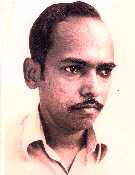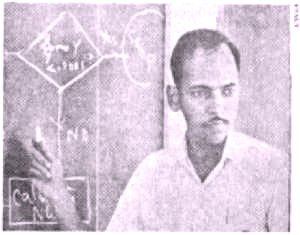

Home | Biodata | Biography | Photo Gallery | Publications | Tributes
Miscellaneous

 |

Home | Biodata | Biography | Photo Gallery | Publications | Tributes Miscellaneous |
 |
|
From early times, man has been inventing devices to assist his brains and muscles to do difficult tasks. To reduce his mental labour used in remembering information, he invented writing. As an aid to mathematical operations, man perfected calculating machines and other devices. Some of these adding machines and desk-calculators are widely used in laboratories, offices and shops. These small machines are purely mechanical devices. But here we shall be mainly concerned with a different class of machines called automatic electronic computers. These computers are growing in number rapidly and have been found very useful in different branches of learning. There are two types of computers--the first is called the analog computer and the second, which is more versatile, is called the digital computer. In popular language, these computers are sometimes called 'giant brains' but they are in reality 'giant clerks'. A computer will take down faithfully any instruction given by the operator and follow it to the letter, without using any intelligence. Another popular misconception is that computers think. Some people even call them ' thinking machines'. Sometimes we talk about a computer as though it were human even though we know that a computer cannot feel pain. Nor can it love another computer. Saying that a computer can think is the same as saying that a radio or a gramophone can sing. There are those who fear that one day the computer may come to dominate its master. This sort of fear may possess a circus trainer or a mahout. A trained elephant sometimes gets angry with the mahout, throws him down and runs amuck. But a computer being only a machine does not get angry with the man who operates it as it cannot think and has no will of its own. It has to remain a 'giant slave'. There is yet another fear that man may delegate his important functions to computers with deleterious effects on his own ability to think. This is the same as saying that going by car has deleterious effects on one's ability to walk. It is true in a sense but it has no disastrous results. So even 50 years after the invention of the computer, man will continue to think. But whether he will think along right lines and on the right things, it is difficult to say. In the technically advanced countries, the machine has replaced the beast completely and the machine has partly replaced the labour of man. Now, we are at the threshold of a second industrial revolution and we are using the machine to do mental labour. The automatic computer is an important machine used by man in this revolution of automation. Computers are basically adding machines but they possess large memories. A large amount of information can be typed out on a device which is connected with the machine. This information is automatically stored in the machine. The instructions as to what to do with the basic data is also stored in the machine's 'memory'. After a particular problem is solved, the memory is cleared and the machine is ready for the next problem. When compared to human memory, machine-memory is small and unlike the machine, the brain goes on accumulating information all its life. Secondly, the computer sorts out the relevant information from the original data and prints out the answer on a typewriting device connected to the machine. A single data-processing machine can do the work of several human clerks cheaply, more efficiently and quickly. Thirdly, the computer has a fantastic speed of operation. A computer can do in about 10 seconds work which will take a human clerk a year. It can calculate at least one million times faster than a man with a paper and pencil. It can read 20,000 letters per second. That is, a computer can read Oliver Twist in 70 seconds. Of course it can neither understand nor enjoy the novel. Good novels and bad novels, interesting novels or badly-written ones are all the same to the computer. It can of course find out very quickly the number of nouns used in the novel, the average length of a sentence used in the novel and so on in a fraction of a minute. A computer may read the New Testament in 20 seconds without showing any signs of enlightenment. This is not the property of the computers alone ! The computer is very widely used in industry, research and military establishments. In big industries, thousands of men and women are employed in different grades and each month, their wages, their bonus, and other benefits have to be calculated. This laborious process is done nowadays by computers. Several complicated problems in manufacturing processes are also solved by computers. Computers have become indispensable to researchers in different branches of knowledge. Diseases, one may say, are a threat to man. But computers are helping man to diagnose and fight diseases. Food-shortage and poverty are threats to man. Now computers are being used in agricultural research to raise food-production and in economics. Here the computer is an aid and not a threat to man. New branches of study have developed as a result of computer science. For example there is the field of machine translation. We know that easy passages from one language to another are translated in a mechanical fashion by human translators. This computers are able to do equally well. If a simple passage in Russian is printed into a computer designed for the purpose, out will come the English translation neatly typed. Science in every advanced country is closely linked with national defence and the preparation for war. During the last war, major developments in electronics and engineering made the development of the computer possible. Computers are used to determine the path of a missile or a satellite. A computer of the size of an orange can determine the path and correct the course of the missile when needed. Computers are now used for defence purposes. In a computer-centred air defence system, the computer assisted by man tracks enemy missiles or aircraft using radar systems. It also guides intercepting rockets and anti-aircraft guns to destroy enemy targets. Primitive man worshipped, among other things, objects found in nature. He was afraid of the snake so he worshipped it. He worshipped anything that had power even if it was only the wind. Even cows were worshipped as they were beneficial to him. We should distinguish between the creature and the creator and give all glory to the creator. God commanded Adam to subdue the earth and use it for his benefit. Western technology grew out of such a view of man and nature. The computer which is a product of western technology is a gift of God to be used to subdue the earth for the prosperity and welfare of all mankind. Sometimes this is forgotten and man uses his power to destroy his neighbour and threaten his weaker brothers. It is an ancient practice in South India to offer worship once a year to weapons of war, tools of one's trade and nowadays to machines of all descriptions. Automobiles, bicycles and typewriters are garlanded and offered worship. There is the same danger of the twentieth century man falling down and worshipping a high-speed electronic computer today. To sum up, the computer by itself is not a threat to man. But man may use it for destructive purposes. The computer has fantastic speed, a large memory and data-processing capacity. It can solve complicated problems quickly. It is not a giant brain but a giant slave. It does not think, it cannot feel. It has no will of its own and it cannot enslave man its master. Like other machines it is a blessing when properly used. Man can use it in his war against poverty and disease. It must be accepted and used giving all the glory to God. Otherwise man may turn primitive and fall down and worship a man-made, high-speed electronic computer. |